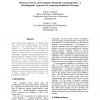Free Online Productivity Tools
i2Speak
i2Symbol
i2OCR
iTex2Img
iWeb2Print
iWeb2Shot
i2Type
iPdf2Split
iPdf2Merge
i2Bopomofo
i2Arabic
i2Style
i2Image
i2PDF
iLatex2Rtf
Sci2ools
117
click to vote
HICSS
2003
IEEE
2003
IEEE
Politeness Theory and Computer-Mediated Communication: A Sociolinguistic Approach to Analyzing Relational Messages
This conceptual paper suggests how Politeness Theory [6] – well known in anthropological and linguistic literatures – can contribute to the study of role relations in computer-mediated communication. Politeness, phrasing things so as to show respect and esteem for the face of others, occurs throughout social interchange. The paper reviews politeness theory and enumerates specific linguistic indices of politeness. It then discusses how recognition of the central role of face-work in social interchange can enhance understanding of why and where emotion-work might occur in CMC, how such emotion-work (in the form of politeness) can be reliably observed and quantitatively measured at a linguistic level of analysis, and how the distribution of politeness phenomena is systematically related to variables of interest in CMC research – such as status, cohesion, impersonality, friendship, and communicative efficiency.
Biometrics | HICSS 2003 | Politeness Theory | Social Interchange | Specific Linguistic Indices | System Sciences |
| Added | 04 Jul 2010 |
| Updated | 04 Jul 2010 |
| Type | Conference |
| Year | 2003 |
| Where | HICSS |
| Authors | David A. Morand, Rosalie J. Ocker |
Comments (0)

